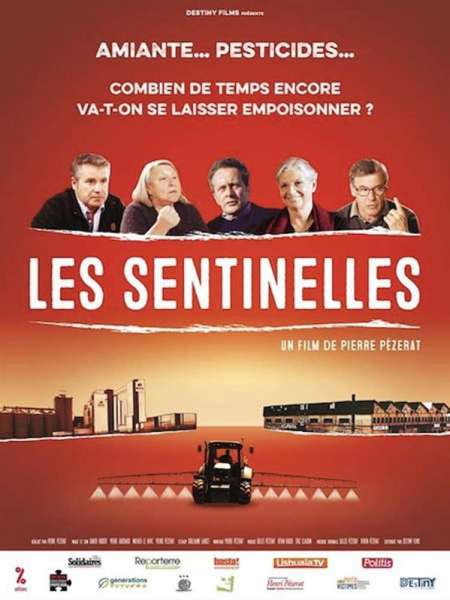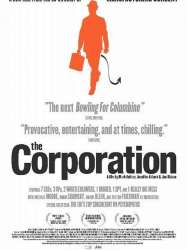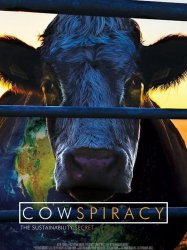Les sentinelles is a french film of genre Documentary
Les sentinelles (2017)

If you like this film, let us know!
OriginFrance
Genres Documentary
Les Sentinelles est un film documentaire français réalisé par Pierre Pézerat, sorti en 2017, qui retrace le combat judiciaire mené par des ouvriers victimes de l'amiante, d'agriculteurs et de salariés exposés à des pesticides.
Synopsis
D'anciens ouvriers et ouvrières d'Amisol, usine de filage et de tissage d'amiante, touchés par de l'asbestose retracent leurs combats pour obtenir dommages et faire interdire l'usage de ces fibres. Le tableau des maladies professionnelles inclut pourtant l'amiante depuis 1945.Comments
Leave comment :
Suggestions of similar film to Les sentinelles
There are 8968 with the same cinematographic genres, 2565 films with the same themes (including 0 films with the same 6 themes than Les sentinelles), to have finally 70 suggestions of similar films.If you liked Les sentinelles, you will probably like those similar films :

The Wanted 18 (2014)
, 1h15Origin Canada
Genres Documentary, Animation
Themes Films set in Africa, Films about animals, Environmental films, Films about religion, Films about the labor movement, Documentary films about business, Documentary films about law, Documentary films about environmental issues, Documentary films about war, Documentary films about historical events, Documentary films about politics, Documentary films about religion, Documentaire sur le monde du travail, Films about cows, Political films, Films about Jews and Judaism, Mise en scène d'un mammifère
Rating71%





L'œuvre présente les efforts des Palestiniens habitant la ville et la région de Beit Sahour, en Cisjordanie, pour démarrer une petite industrie laitière locale au cours de la première Intifada, en cachant un troupeau de dix-huit vaches laitières aux forces de sécurité israéliennes qui considérait la production de laitages comme une menace pour la sécurité nationale d'Israël.

The Corporation (2003)
, 2h25Directed by Jennifer Abbott, Mark Achbar
Origin Canada
Genres Documentary
Themes Environmental films, Medical-themed films, La mondialisation, Films about the labor movement, Documentary films about business, Documentary films about environmental issues, Documentaire sur une personnalité, Documentary films about politics, Documentary films about health care, Documentaire sur le monde du travail, Films about psychiatry, Films about disabilities, Political films
Actors Michael Moore, Naomi Klein
Rating79%





The documentary shows the development of the contemporary business corporation, from a legal entity that originated as a government-chartered institution meant to affect specific public functions to the rise of the modern commercial institution entitled to most of the legal rights of a person. The documentary concentrates mostly upon North American corporations, especially those in the United States. One theme is its assessment of corporations as persons, as a result of an 1886 case in the United States Supreme Court in which a statement by Chief Justice Morrison R. Waite led to corporations as "persons" having the same rights as human beings, based on the Fourteenth Amendment to the United States Constitution.
 , 1h31
, 1h31Origin USA
Genres Documentary
Themes Films about animals, Environmental films, Politique, Films about the labor movement, Documentary films about business, Documentary films about animal rights, Documentaire animalier, Documentary films about law, Documentary films about environmental issues, Documentaire sur le monde du travail, Political films, Documentary films about nature
Rating80%





Cowspiracy est un documentaire d'importance majeure. Controversé, il se penche sur l'impact de l'élevage sur l'environnement. Kip Andersen, producteur et directeur du film, révèle des informations exclusives portant sur les politiques de groupes environnementaux comme Greenpeace, Sierra Club, Surfrider Foundation, and Rainforest Action Network en plus de statistiques alarmantes sur les impacts que génèrent la consommation de viande.
 , 1h52
, 1h52Directed by Jean-Paul Jaud
Origin France
Genres Documentary
Themes Cooking films, Environmental films, Films about the labor movement, Documentaire sur la cuisine, Documentary films about business, Documentary films about environmental issues, Documentaire sur la malbouffe, Documentary films about health care, Documentaire sur le monde du travail, Documentary films about nature
Rating67%





Our Children Will Accuse Us tells the story of an initiative in Barjac, a commune located in the Gard department in southern France, that decided to introduce organic produce into the town's school cafeteria. The film depicts without concessions the environmental tragedy which threatens the young generation: the poisoning of our country sides by agricultural pesticides (76 000 tons of pesticides used each year in France) and the harm caused to public health and safety.
 , 1h37
, 1h37Directed by Fernando Solanas
Origin Argentine
Genres Documentary
Themes Environmental films, Films about the labor movement, Documentary films about environmental issues, Documentary films about health care, Documentaire sur le monde du travail
Rating62%





Fernando Solanas voyage au travers de l'Argentine et nous dresse un bilan des méfaits de la monoculture du soja OGM sur l'environnement et l'impact de l'utilisation intensive des agrotoxiques sur la santé des habitants des zones agricoles.

Blood of the Beasts (1949)
, 21minutesDirected by Georges Franju
Origin France
Genres Documentary, Horror
Themes Films about animals, Environmental films, Politique, Films about the labor movement, Documentary films about animal rights, Documentaire animalier, Documentary films about law, Documentary films about environmental issues, Documentaire sur le monde du travail, Political films, Documentary films about nature
Actors Georges Hubert, Nicole Ladmiral
Rating76%





Franju's film contrasts peaceful scenes of Parisian suburbia with scenes from a slaughterhouse. The film documents the slaughtering and butchering of horses, cattle, and sheep. The film is narrated without emotive language.

We Feed the World (2005)
, 1h36Directed by Erwin Wagenhofer
Origin Austria
Genres Documentary
Themes Cooking films, Environmental films, La mondialisation, Films about the labor movement, Documentaire sur la cuisine, Documentary films about business, Documentaire sur l'altermondialisme, Documentary films about environmental issues, Documentaire sur la malbouffe, Documentaire sur le monde paysan, Documentary films about health care, Documentaire sur le monde du travail
Rating74%





Avec We Feed the World, le documentariste Erwin Wagenhofer propose aux spectateurs un regard sur l'agriculture mondiale moderne. En passant par la Roumanie, l'Autriche, le Brésil, la France et l'Espagne, son enquête se focalise sur la manière dont est fabriqué ce qui arrive dans notre assiette. Il montre que la domination du Nord sur le Sud est prégnante. Comment est-il possible qu'en Afrique l'on achète des produits européens ou asiatiques comme le poulet thaïlandais ? Le réalisateur présente une face peu connue de la mondialisation : en achetant un poulet industriel, on contribue au défrichement de l'Amazonie car le Brésil déforeste pour cultiver le soja qui sert à nourrir les volailles élevées en batterie (90 % de la production de soja du Brésil est exportée). Le documentaire souligne également la différence entre industrie agroalimentaire et petite exploitation. We Feed the World adopte un style « coup de poing » visant à éveiller les consciences.

Katanga Business (2009)
, 1h30Directed by Thierry Michel
Origin Belgique
Genres Documentary
Themes Films set in Africa, Environmental films, La mondialisation, Films about the labor movement, Documentary films about business, Documentary films about environmental issues, Documentaire sur le monde du travail
Rating68%





The province of Katanga in the south east of the Democratic Republic of the Congo (DRC) has huge mineral riches including uranium, zinc, copper and cobalt.

The Light Bulb Conspiracy (2010)
, 1h15Genres Documentary
Themes Environmental films, La mondialisation, Films about the labor movement, Documentary films about business, Documentaire sur l'altermondialisme, Documentary films about environmental issues, Documentary films about historical events, Documentary films about technology, Documentaire sur le monde du travail
Actors Casey Neistat
Rating79%





Un historique de cette stratégie commerciale et industrielle visant à limiter la durée de vie de certains produits ou appareils est relaté à travers plusieurs exemples particulièrement significatifs.

The Great Resistance (2007)
, 1h15Directed by Denys Desjardins
Origin Quebec
Genres Documentary
Themes Environmental films, Films about the labor movement, Documentary films about business, Documentary films about environmental issues, Documentaire sur le monde du travail
In the 1930s, in the throes of the Great Depression, the government of Quebec relocated more than 80,000 citizens to found a new settlement in the virgin forests of Quebec’s Abitibi region. After enduring backbreaking work to clear the land, however, many left, seeking a better life in the city or as labourers for the large corporations that had come to exploit the North’s valuable resources. The Lalancette family, however, have persisted in forging their future on the land from one generation to the next, earning their keep from farming, and defying the constraints of globalization and the mining and forestry companies that control the area. Revisiting the heritage of Quebec filmmakers who documented Abitibi, following in the footsteps of Pierre Perrault, among others, this documentary traces a defining chapter of Quebec history and raises fundamental questions about regional development.
 Connection
Connection